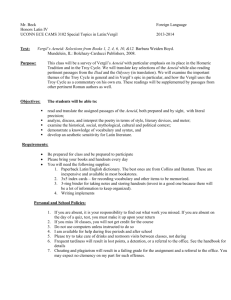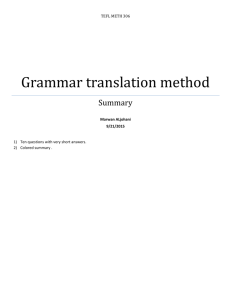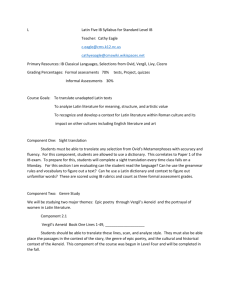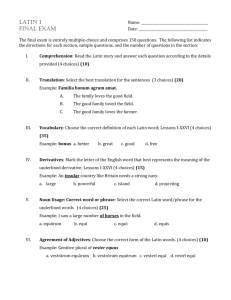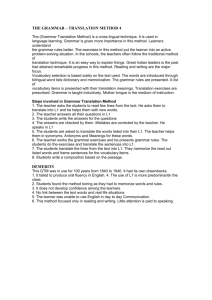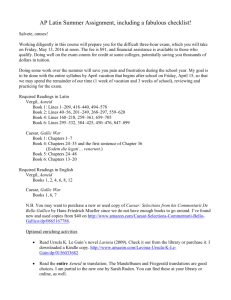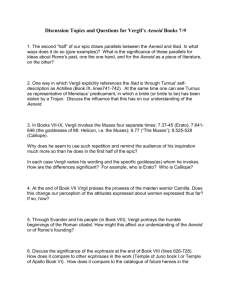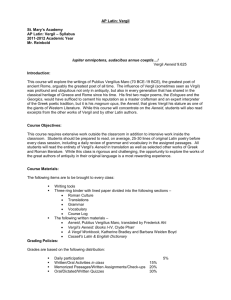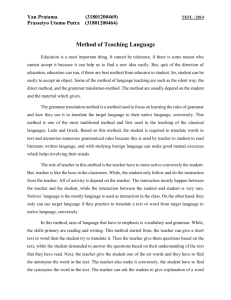Ap Latin: vergil, syllabus 2007-2008
advertisement
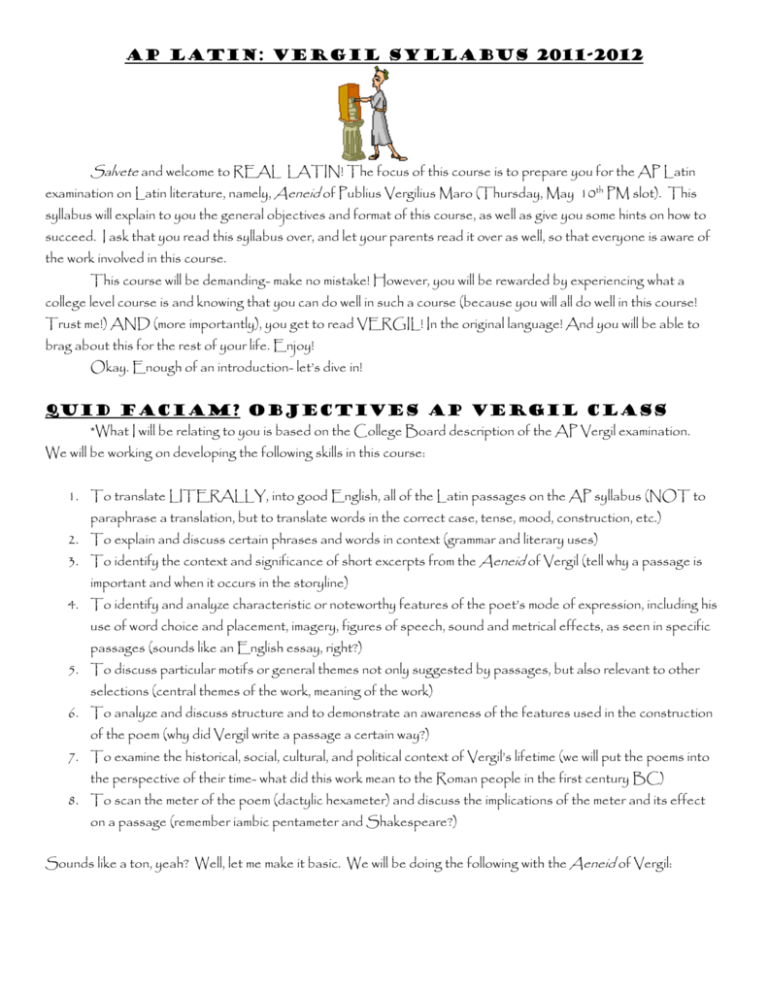
AP Latin: VERGIL Syllabus 2011-2012 Salvete and welcome to REAL LATIN! The focus of this course is to prepare you for the AP Latin examination on Latin literature, namely, Aeneid of Publius Vergilius Maro (Thursday, May 10th PM slot). This syllabus will explain to you the general objectives and format of this course, as well as give you some hints on how to succeed. I ask that you read this syllabus over, and let your parents read it over as well, so that everyone is aware of the work involved in this course. This course will be demanding- make no mistake! However, you will be rewarded by experiencing what a college level course is and knowing that you can do well in such a course (because you will all do well in this course! Trust me!) AND (more importantly), you get to read VERGIL! In the original language! And you will be able to brag about this for the rest of your life. Enjoy! Okay. Enough of an introduction- let’s dive in! Quid faciam? Objectives AP Vergil class *What I will be relating to you is based on the College Board description of the AP Vergil examination. We will be working on developing the following skills in this course: 1. To translate LITERALLY, into good English, all of the Latin passages on the AP syllabus (NOT to paraphrase a translation, but to translate words in the correct case, tense, mood, construction, etc.) 2. To explain and discuss certain phrases and words in context (grammar and literary uses) 3. To identify the context and significance of short excerpts from the Aeneid of Vergil (tell why a passage is important and when it occurs in the storyline) 4. To identify and analyze characteristic or noteworthy features of the poet’s mode of expression, including his use of word choice and placement, imagery, figures of speech, sound and metrical effects, as seen in specific passages (sounds like an English essay, right?) 5. To discuss particular motifs or general themes not only suggested by passages, but also relevant to other selections (central themes of the work, meaning of the work) 6. To analyze and discuss structure and to demonstrate an awareness of the features used in the construction of the poem (why did Vergil write a passage a certain way?) 7. To examine the historical, social, cultural, and political context of Vergil’s lifetime (we will put the poems into the perspective of their time- what did this work mean to the Roman people in the first century BC) 8. To scan the meter of the poem (dactylic hexameter) and discuss the implications of the meter and its effect on a passage (remember iambic pentameter and Shakespeare?) Sounds like a ton, yeah? Well, let me make it basic. We will be doing the following with the Aeneid of Vergil: 1. We will be treating the poem as a piece of Latin- you will translate the poem, accurately, Latin into English. You will also demonstrate your understanding of Latin grammar and vocabulary through your literal translation AND through Multiple Choice questions on grammar and translation. 2. We will be treating the poem as a piece of literature (an epic poem), much like you do in English, and will examine the literary devices/figures of speech, plot, and meter. 3. We will be treating the poem as a piece of literature in an historical context, and will examine how the work was influenced by other authors in its time and how it fit into the time period when it was authored. Format of the AP Vergil exam *Now that we have gone over the objectives, based on the exam, let me tell you the format of the AP exam, so that you will understand the types of questions you will be encountering. We will be doing TONS of practice exams and questions, so worry not! The AP Literature Exam consists of: 1. 50-multiple choice question in 60 minutes; mostly based on passages (1 prepared and 3 at sight, some poetry and prose); these questions will test grammar, syntax, reference, context, meter, figures of speech, and background knowledge 2. 15 minute reading period/1 hour and 45 minute testing time for: a. 2 10-minute translation passages b. 45 minute long essay (usually passage based) c. 2 20-minute short essays (one based on a Latin passage, one based on English sections of Aeneid that you read over the summer) Lines read for AP Literature The course will cover the following lines from the Aeneid: Book 1: lines 1-519 Book 2: lines 1-56, 199-297, 469-566, and 735-804 Book 4: lines 1-448, 642-705 Book 6: lines 1-211, 450-476, and 847-901 Book 10: lines 420-509 Book 12: lines 791-842, 887-952 Total number of lines: 1,856 Familiarity with the entire content of Books 1 through 12 will also be tested. What do I need? Supplies and materials *You will need the following books: 1. A Song of War: Reading from Vergil’s Aeneid by LaFleur and McKay (given out in class) * You should have the following items: (aka- HIGHLY recommended) 1. Vergil’s Aeneid- Selections from Books 1, 2, 4, 6, 10, and 12- Barbara Weiden Boyd (student edition) ($41) a. This book is a supplement to the textbook we use in class 2. Vergil Vocabulary Cards for AP Selections- Dennis De Young a. This is fabulous! They are premade flashcards of Vergil’s vocabulary, from most used to least used. Those who want to get a jump, review these all summer and you will rock! Vocabulary is always an issue in AP. ($29) 3. You may want to purchase a Latin dictionary for the class- the Vergil books will have dictionaries, but an outside one will be useful for sight reading. ($5-$30- depends on the price. Get one with English-Latin as well) *You will need the following items: 1. 3- ring Binder (about 3 inches) used only for Latin class, which should include: a. Notebook paper in the front b. 6 dividers, labeled: Section Organizers, Rough and Final Translations, Literary Devices and Scansion, Supplemental (grammar, readings), Tests/Quizzes, and AP Exam Prep 2. Pencil, red pen, black pen, highlighters (yellow, green, blue, pink, orange, purple) 3. A Composition Notebook (1 subject) which you will leave in the classroom- used for pop quizzes and in class essay writing How will I be assessed? Grading policies Please see my regular syllabus for grading policy in general; see here “AP Specific” grades. 1. 100% of your grade= Summative Assessments a. These will include- daily vocabulary in-context quizzes, homework check quizzes; essays, research, thought questions, exams, translation quizzes, projects, sample AP exams, multiple choice 2. Formative assessments- mainly vocabulary , grammar, or translation “check” for knowledge- these will be frequent and ungraded- they are meant for you and I to know where you are progressing. 3. I won’t be checking homework, except via homework check quizzes. Remember that you will not succeed if you don’t do your homework. The only time I will collect homework translations is for “honesty” spot checks, to see that you are translating and not make a joke of this class by copying from the internet. 4. Blog responses are optional, but will win you some silly, random prizes. Maybe a free vocabulary word every now and then. What will I be doing each day? *Here is what we will be doing on a “typical” day in Latin, including what your homework will likely be: 1. When you come into the class, get out your homework and materials for class. We will begin promptly, with either a FACITE IAM (Do now- a practice or warm-up on grammar, translation, vocabulary, or scansion) or a Quiz (vocabulary or translation of previous day- I may NOT tell you which type, so Semper parati erimus!) 2. We will review the FACITE IAM or quiz. 3. One student may be responsible for leading a review on the previous class’ work. 4. Then, we will proceed to the activity of the day, which may be: a. Translating a section you have prepared for homework, using an overhead and your “Rough Translation” sheets and “Section Organizers” (see below) OR translating a section at sightworking together to do something you haven’t seen before b. Working on scansion or analyzing literary/historical aspects of the work, using through discussion of passages, essays, oral review, or discussing an article c. This year, you will also be reading aloud passages to help you with meter. I will read until the end of Marking Period 1- then, the show is yours! 5. A few minutes before the class ends, we will review all the work done that day, take questions, and assign new work. 6. ******ABSENCE POLICY*****- I f you are absent from class, you need to make up any tests or quizzes OUTSIDE of class time. You must also attend a morning or afternoon session with Magistra to read the lines you missed. Wow. This sounds like a lot! How can I succeed? *This is easy- keep up with your work, and you will succeed. Here are my tips and some of the methods that I will insist upon this year: 1. You will receive a “Poem Organizer” for each poem/segment of lines we will translate. This organizer will have sections for: Vocabulary, Grammar, Literary Devices, People/Places/Plot, and Important Themes/Ideas. You will look up vocabulary specified for each section (which we will quiz on- it is not all the vocabulary, only the important words), list out any tough grammar sequences (or review some grammar idea), list out literary devices that are important to know in the passage, and list out all the important story lines/characters. Why? Because, when you go back to review all these segments later, you have all this information there and waiting! 2. FOR HOMEWORK- you will be required to answer an “Thought Questions” on the back- these will spark discussion in class and be a great aid to help you think/plan for exam essays. 3. You will also receive a “Rough and Final Translation” sheet online- this is mainly a photocopy of the text you are reading, with spaces between the lines. YOU must print this out for each translation. When you first translate the passage, write your translation (and vocabulary, usually with arrows all about) in PENCILthen, when we go back and translate in class, you can erase mistakes. The night after we translate, you can then go home and write a final translation in RED or BLACK PEN, and voila! You have a translation to review. 4. ALWAYS- read the NOTES provided in your textbook BEFORE you translate! It will save your life! LOVE THE NOTES! Take notes on the notes on your “Rough” translation in pencil. 5. You may want to read the English of the section you are about to translate in the beginning of the year- but DO NOT be tempted to use the English as a crutch! You won’t learn Latin and you won’t do well on the test! RESIST! 6. Here is my way to learn these passages well- Read them ALL FIVE TIMES! Here is how: a. First time- when you are doing your rough translation b. Second time- in class together c. Third time- at night, after we do it in class, when you write it in red d. Fourth time- Before a quiz e. Fifth time- Before a test/exam f. The Last Time- in your final review for the AP DO THIS AND YOU WILL HAVE A FIRM GRASP OF THE PASSAGES! STUDENT RESPONSIBILITIES 1. We must read 50-75 lines a week to finish the syllabus. This is a reality- so, getting behind is something that you must work to avoid. 2. You must always review and reread the assignment from the previous class. 3. You must prepare all new assignments (line translations, organizers, other sheets). 4. You must be familiar with all the notes and grammar references in the textbook. 5. You must ask questions in class and participate in discussions on vocabulary, grammar, forms, syntax, significance, and historical background. 6. You must bring your book, binder, and writing utensils. You must not lose work. 7. You must be prepared for daily vocabulary and/or translation quizzes. You must be prepared to read aloud and translate each day. Tentative schedule- 2011-2012 *this is open to change and is for general reference: Term 1 1. Translate- Book I 2. Discuss: a. Historical, literary, and mythological background of the poem b. Review the Iliad, epic poetry in general c. Life and times of Vergil, Augustus, and Maecenas d. Epic poetry in general e. 3. Goals: a. Work up to reading 50 lines a week b. Scan in Dactylic hexameter c. Know figures of speech in English and identify in Latin d. Review Grammar (subjunctive, participle, gerund) e. Learn to write a thesis, find evidence, and plan essays Term 2 1. Translate- Book II and IV 2. In English- Book II and III 3. Discuss: a. Life of Augustus- Suetonius (in English) b. Rome and Carthage c. Vergil and Homer (Trojan mythology) 4. Goals: a. Grammar assignment in Book 2 (identify grammar forms and use) b. Write short essays (thesis, plan, find evidence, build argument) c. Read aloud all lines d. Translate as individuals- ONE SCRIBE for written translations e. Multiple Choice- Vergil only Term 3 1. Translate- Book IV and VI 2. In English- Book IV – V 3. Discuss: a. Res Gestae- Augustus b. Underworld, Sibyl, Rome in the Underworld c. Odyssey review d. PROJECT- Dido and Aeneas class debate 4. Goals: a. Literary Device assignments (identify, write short papers) b. Write long essays (thesis, plan, find evidence, build argument) c. Read aloud with meter d. Multiple Choice- sight passages Term 4 1. Translate Books VI, X, and XII 2. In English- Books VI-XII 3. Discuss a. Underworld (still) b. Rome of Augustus in the Aeneid c. Early Roman History and Myth d. Archaeology and history- Early Rome and Italy e. Essays- timed f. Translation- timed g. Multiple Choice h. REVIEW- all previous work (divide and conquer) i. Sample AP exams j. Project after AP exam/teaching Latin IV ADDENDUM Concerning the Use of Online Translators Online translations of Vergil’s Aeneid exist. In the past, I have had students copy online translations on to their rough translation sheets, and hand it in for a homework grade. Their excuse? They were too busy. They didn’t have enough time. That is plagiarism. That is cheating. That is not your work. That is unacceptable in this class. If you copy online translations and try to pass it off as your own work, you will: a. Receive a “0” for the assignment. b. A note will be sent home, a referral will be written, and a note will be sent to Guidance. c. I will not write you a college recommendation. If I have already written one for you, I will call the universities and ask them to remove the letter and explain why. The use of online dictionaries or websites that I will provide for you (www.nodictionaries.com, www.perseus.tufts.edu, or the UPENN Vergil project) are acceptable, because they give you grammar and vocabulary aid, they do not simply give you the translation. I have read the ENTIRE AP LATIN SYLLABUS for VERGIL. I understand the work load that is required of me and I will aim to keep myself on track. I will seek help and advice from Mrs. Klipfer when I need it. ________________________________________ _________________________ Student Signature and date _______________________________________________________ Student e-mail that they will check ________________________________________ _________________________ Parent/Guardian Signature and date _______________________________________________________ Parent/Guardian e-mail that they will check
